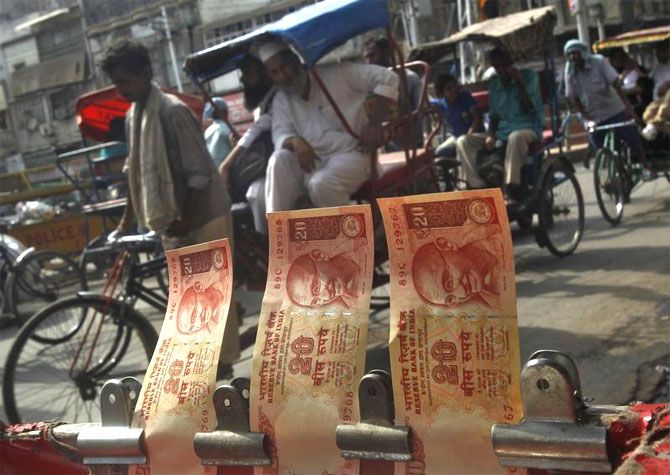 | « Back to article | Print this article |

Aimed at creating a single tax for goods and services across the country, government on Friday introduced the long-pending GST Bill in the Lok Sabha for roll-out of the new regime from April 2016 subsuming various levies like entry tax and octroi.
Touted as the single biggest indirect taxation reforms since independence and a "win-win" for Centre and states, the 122nd Constitution Amendment Bill for Goods and Services Tax (GST) was tabled by Finance Minister Arun Jaitley after extensive discussions to get states on board by addressing their concerns.
"It is expected that introduction of GST will foster a common and seamless Indian market and contribute significantly to the growth of the economy," Jaitley said.
A single rate GST will replace central excise, state VAT, entertainment tax, octroi, entry tax, luxury tax and purchase tax on goods and services to ensure seamless transfer and end of "inspector raj" as well as "tax on tax," he said. "It will be single most tax reform after 1947."
While liquor has been completely kept out of the GST, petroleum products like petrol and diesel will be part of the new regime from a date to be decided at a future date by the GST Council, which will have two-third of its members from states. All decisions in the Council will require 75 per cent votes.
Also the states where goods originate can levy 1 per cent additional tax over GST to make up for any revenue loss for the first two years.
As regards the compensation to the states on account of any possible loss of revenue following implementation of the GST, Jaitley said there will be 100 per cent compensation in first three years, 75 per cent in the fourth year and 50 per cent in the fifth year.
The Bill will be considered for passing in the Budget session of Parliament beginning February, the Minister said, adding he did not feel the necessity of the legislation being referred again to a Standing Committee.
Under the provisions of the Bill, petroleum goods will be part of the GST but they will be levied at zero rate, implying that the states will continue to levy VAT while Centre will levy excise duty in the initial few years.
Jaitley said: "This 1 per cent tax and the compensation mechanism for 5 years during the transition phase will be adequate, We do not envisage revenue loss to the states."
KPMG Partner Pratik Jain said: "The speed with which the government has introduced the Bill in the Parliament shows the seriousness attached with this important reform". As regards the impact of GST implementation on prices, Revenue Secretary Shaktikanta Das said "prices will remain stable".
"The general expectation (from GST) is that there will be no tax on tax. There will be no cascading effect. So the general expectation is that over a period of time, the prices will stabilise. There is a general expectation that there will be a buoyancy in the GDP growth of the country also," he said.
Jaitley said compensation of past Central Sales Tax (CST) dues to states will be done in instalment. "I do intend to provide for an installment in this financial year which goes on to March 31," the minister said, adding that he will seek Supplementary Grants in the Budget session for the purpose.
The composition of the GST Council, which is to decide the tax rate as well as the date of subsuming petroleum taxes in the new regime, is reflective of the "concept of cooperative federalism", he said.
Commenting on GST, EY Partner Harishanker Subramaniam said: "The biggest concern is the additional 1 per cent levy the states have been allowed to charge as an origin tax outside the GST structure. This intrinsically will be a conflict to the destination based concept under GST and will lead to continued cascading".